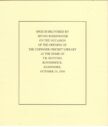The Ashes: Match of My Life
Martin Chandler |Published: 2013
Pages: 223
Author: Pilger, Sam and Wightman, Rob
Publisher: Pitch Publishing
Rating: 4 stars

Whatever the general trend across the cricket world might be when it comes to England playing against Australia the Test match is still king. It was so in the 1990s when Australia were dominant, and it remains the case now that England are on top.
The popularity of the Ashes clearly extends to a readership who are, essentially, not cricket fans at all. After all were that not the case why would we see such a proliferation of books about the history of the contest? Publishers are not fools, and I have no doubt that the various books that have appeared (or reappeared in an updated form) this summer will all have sold reasonably well.
I always pass by such books if I can, not because they are necessarily poorly written or put together, but because I already know the history of the Ashes, and no amount of humourous anecdote, much of which I will be aware of from other sources anyway, is going to hold my attention for very long. So I must confess to having approached this book, which looks like little more than a variation on a long established theme, with some diffidence.
Having gritted my teeth and picked up The Ashes: Match of My Life it was actually difficult to put down, notwithstanding that the book’s format is certainly not original. What it boils down to is the stories of fourteen men, centred in each case around a specific match. The range is the longest now possible, Neil Harvey on 1948, through to Paul Collingwood on 2010/11.
Although the individual chapters concentrate on one particular match they set that in the context of the entire series and, to a greater or lesser extent, also open up the personalities of the individual involved. All are written in the first person, and presumably ghosted by Pilger or Wightman, and the best of the chapters are those that are the most revealing about the men involved.
Outstanding for me, perhaps surprisingly given that I am an Englishman, were the chapters concerning three Australians. That which I enjoyed most was Jeff Thomson on 1974/75. I remember that series well, and the matches themselves are fully covered elsewhere, but here we learn what Thommo and his teammates were actually thinking, and the nature of the beast that in those days he quite literally was is skilfully set out. It is a shame that Tony Greig did not live long enough to see the book published – he would have delighted in reading about just how pivotal his role was in the eyes of his opponents.
Big Bad Merv Hughes was a bit like Thommo, and perhaps that is why his chapter also works so well. It is true that Merv’s character is uncomplicated, and largely laid bare in the way he conducted himself on the field, but the thoughts of the fiery paceman still contain a few surprises, and show a depth to Merv’s persona that the average Englishman will have no idea about.
For all English readers of the book, save for the very young, 2005 will be their fondest memory, so it was fitting that for once there are two chapters covering that famous series. An English view is provided by Ashley Giles, but more enjoyable are the thoughts of Glenn “5-0” McGrath. His take on the series is unavowedly aussiecentric, something in itself that is refreshing given that most who have ventured into print about that magical summer are Englishmen. I enjoyed reading about the series from a point of view that was parked well and truly in the centre of the Australian dressing room, and the chapter certainly surprised me. I had to do more than one double take at the sentence What made losing the Ashes slightly easier was the firm knowledge that we had lost to the better team. I was all ready to criticise the proof reader for missing out the crucial word “not”, until it became clear from the rest of the paragraph that “Pigeon” really did mean exactly what I had read.
Elsewhere in the book you have Ray Illingworth on 1970/71, Geoffrey Boycott on 1977, David Gower on 1985 and John Emburey on 1986/87. The inclusion of Headingley 1981 is entirely predictable and appropriate, and if I had been given a choice about who told the story it would have been Bob Willis, whose magnificent 8-43 is so rarely given even joint top billing with a certain all-rounder’s unbeaten 149, let alone the starring role I have always believed it deserved.
The Australian contingent is completed by Mark Taylor on 1989, Justin Langer on 2002/03 and Mike Hussey on 2006/07, so there are some happy memories to be rekindled for those resident in the Southern Hemisphere.
The front of the dust jacket of The Ashes: Match of My Life quotes the late Frank Keating as describing the book as One of the greatest ever books on the Ashes. I am not about to argue with the man who was one of the best scribes the game has seen. This is an excellent book, and highly recommended.






Leave a comment